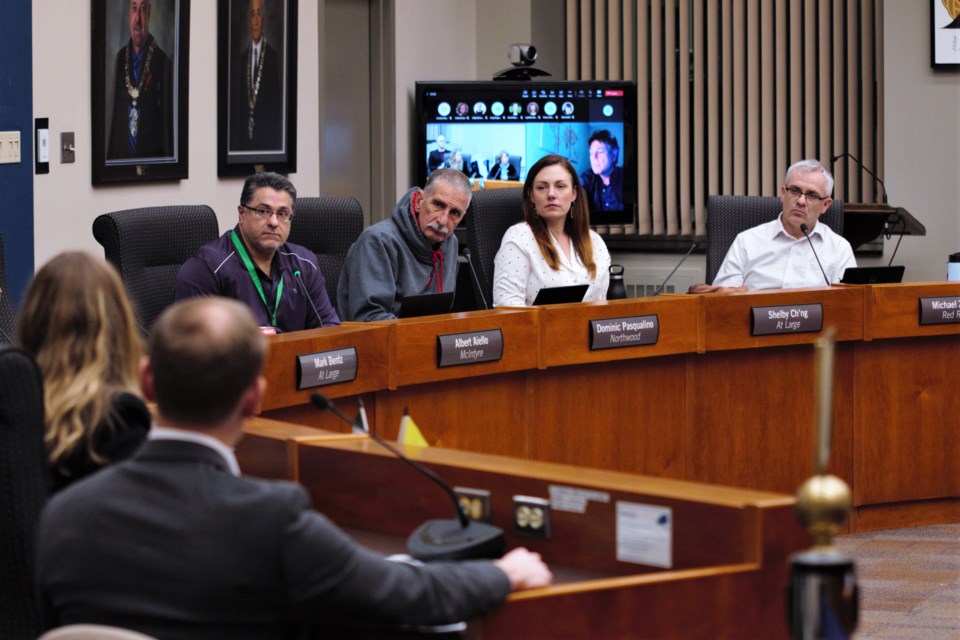THUNDER BAY — City councillors and staff are defending changes that will leave the public with fewer opportunities to provide feedback on the budget.
Leaders argue the changes, which include replacing two televised public deputation meetings with a more informal question-and-answer session, will offer citizens better ways to learn about the budget.
Some have raised concerns that will stifle the public’s ability to convey concerns to city council before it approves the roughly half-billion dollar spending plan, however.
Council approved changes to the budget process in June, condensing it and eliminating public deputations in favour of the Q&A.
The session, planned for Jan. 25, will offer residents the chance to engage with staff from various city departments on the budget, in a format leaders say will be less intimidating and more informative.
The city says councillors will also be present at the session.
What the new process won’t do is offer citizens and local groups the chance to formally address council with concerns or advocacy for changes.
Previously, residents could provide feedback at a pre-budget deputation meeting, and at a second post-budget meeting after council debates the budget, but before final approval.
In 2023, for example, council heard calls to invest in trails, bike lanes, and public transit, while the Thunder Bay Chamber of Commerce made its case for lower tax hikes.
The city will continue to solicit feedback through a pre-budget survey, with results shared with councillors.
Decision-makers point to low participation in the deputation meetings as one reason for the change.
In recent years, the meetings have typically attracted between three and eight deputants.
The city was forced to cancel the post-budget meeting in 2022, after receiving no deputation requests.
The city also reported this year's pre- and post-budget deputation meetings were viewed by only 61 and 70 people, respectively.
Chamber of Commerce president Charla Robinson, who has regularly used deputations to present feedback from the business community, expressed concern over their elimination.
“It’s certainly a bit of a step backwards, I think, if you’re looking for accountability and transparency on the discussions that are happening,” she said.
“It’s on the record, it’s very public… Now basically what will be happening will be one-on-one private conversations.”
The chamber will adjust its strategy, perhaps contacting councillors one-on-one, she said – but added that will be more challenging for individual citizens or smaller, volunteer-led groups.
Robinson hopes councillors will look for budget feedback at ward meetings over the coming months.
That’s one way resident Vern Seymour plans to have his budget feedback heard.
Seymour was taken aback when he saw that deputation meetings had been eliminated.
“What you’ve done is you’ve cut the public out of everything,” he said.
He also expressed skepticism over the reasoning that relatively few people had engaged with the meetings.
“Five people did a deputation — you’ve now silenced those five people,” he said. “And how do [city leaders] know we’re not going to have 10 or 15 deputations [this year]?”
City manager Norm Gale said residents still have many other ways to air their concerns, like social media, letters to the editor, and communicating directly with councillors.
He believes the Q&A session could encourage more engagement.
“It’s conversational, rather than making a presentation with the cameras on you,” he said. “We think it’s less pressure and more direct, and just a better opportunity for people to provide their input.”
Any input residents provide to staff during the session will not be recorded or tracked, however.
Coun. Shelby Ch’ng suggested making a deputation — which puts citizens on camera while they present and take questions from council — can be intimidating and exclusionary.
“I think many people just do not want to speak on camera,” she said. “It’s the engagement piece that I’m looking for, and over my last nine budgets, I don’t think the [deputation meetings] have had the interaction we need as council to help make a decision.”
“We got so much more feedback from the public consultation via a survey,” Ch’ng added. “So do we keep producing these things that aren’t really that fruitful, for maybe two or three interest groups? I don’t know if that’s a good use of our time.”
Still, Ch’ng said the deputation process has also “been very helpful” at times, sometimes influencing council decisions.
“I know the Friends of the Conservatory, for example, were very diligent coming forward — and look where the conservatory is now. I wouldn’t have been able to sway council the way I have been without those deputations.”
She added deputations like that could also take place outside of the budget process, however.
Budget chair Coun. Mark Bentz called the new approach a “work in progress” that will be re-evaluated later in 2024, but called the Q&A more likely to foster “real conversation” and understanding.
“I suspect [people] will find that a more effective way to get information than a deputation,” he said. “It’s still a very transparent process. I think it will lead to more information going to the public, and that’s our main goal.”
According to Gale, “absolutely the number one” budget issue he hears about from the public is taxation levels.
Council has tentatively targeted a historically high 6.1 per cent tax levy increase in 2024, or 5.5 per cent after accounting for growth in the tax base.
The budget changes came as council weighed options to make the process “more strategic,” after complaints from a number of councillors that discussions are too unfocused and often got stuck in the weeds.
After this year’s budget, the city will consider reducing the number of budget meetings and new approaches like multi-year budgeting or “service delivery budgeting.”
